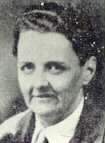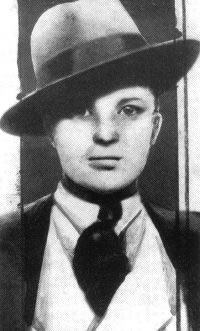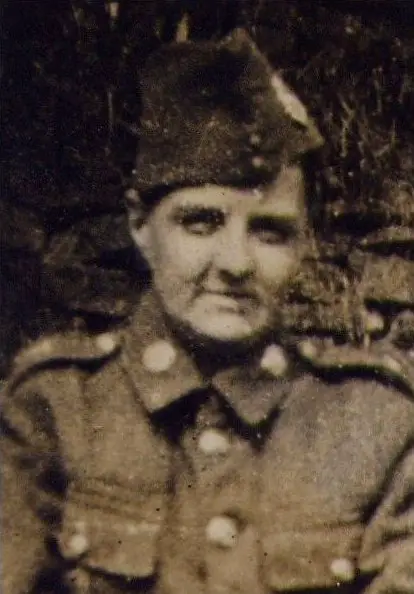Margaret Allen
On 29th August 1948 Nancy
Chadwick, an elderly, cantankerous widow, was found dead in the street
outside Margaret Allen's house in Manchester. The old woman had been
battered with the pointed end of a coal hammer. Bloodstains led back
to Margaret Allen's house and the police suspected her from the start.
She was very talkative with reporters and customers in her local pub
whenever the subject of the murder was raised. She was also the first
to point out Mrs Chadwick's shopping bag floating in the River Irwell
that ran behind the house. The police, however, were playing a waiting
game.
'Bill' Allen, as the 42-year-old
lesbian preferred to be known, did not know when to keep her mouth
closed and, after several pints in her local, she was boasting that
she was the last person to see the victim alive. She also let it be
known that Mrs Chadwick had been wearing an underskirt with a hidden
pocket sewn into it. She was visited by police on 1st September and
quickly confessed saying that "I was in a funny mood."
Allen's trial, in which she
appeared dressed in men's clothing, only lasted five hours with the
jury taking just fifteen minutes to find her guilty. A petition was
raised to try and save her but there were only 162 signatures on it
and she was hanged at Strangeways Prison on 12th January 1949 by
Albert Pierrepoint.
Murder-uk.com
Margaret Allen
The murder of Nancy Chadwick in 1948 interests many
criminologists. What led her killer to brutally end her life? Was it
greed?, uncontrollable anger? or a mental disorder? Perhaps all of
these factors contributed to the crime? Some authors have described
the slaying as 'mindless' and 'motiveless'; others suggest that Mrs
Chadwick was 'killed on a whim' and see it as a baffling enigma - the
work of an unstable and erratic person who is beyond rational
evaluation.
Margaret Allen, her killer, was a troubled and
gender-confused individual. In more modern times, she would have been
seen as a transexual and could have sought appropriate help for her
problems; but Allen was born in 1906 (she was part of an immense
working class family - the twentieth child of twenty-two offspring)
and lived in an age when people like herself were not understood.
From an early age, she denied her own femininity
and strove to act in a masculine manner. Allen preferred the company
of burly male workers in her home town Rawtenstall (in Lancashire,
England) and took on jobs usually given to men. She loaded coal,
repaired houses and became a bus conductor. Unfortunately, her desire
to adopt 'male traits' led her to swear, act aggresively and resort to
physical violence. The bus company fired her for abusing passengers;
customers who didn't take their seats quickly enough were likely to be
verbally assaulted, shoved and cuffed.
In 1935, Allen claimed that she'd checked into a
hospital for what she described as a "delicate" operation. Later, she
suggested that the purpose of this procedure had been to change her
"from a woman to a man." It seems likely that Allen was being
untruthful about (or at least exaggerating) the nature of any
treatment she received. Perhaps she so desperately wanted to change
her gender (and be accepted as a man) that she sought to convince
herself and/or others that she had been physically altered.
Whatever the real facts of the matter were, after
asserting that she'd had the operation, Allen made no pretence about
her turnabout sexual role; she called herself "Bill", cut her hair
short, donned male clothes and drank in public houses (bars) and
working men's clubs. She had no female friends except for Mrs. Annie
Cook. Allen apparently saw this lady as a potential 'girlfriend' - but
their relationship stalled when Allen took Mrs. Cook on vacation and
asked to have sex with her. The offended Mrs. Cook refused and made it
clear that she had no interest in Allen as a lover.
In 1943, when her mother died, Allen was badly
affected and she became even more withdrawn from 'normal' social
activities. Her smoking became excessive, she didn't eat properly,
allowed herself to become unkempt and went through bouts of bleak
depression.
Allen invested her savings in the purchase of a
dilapidated building that once served as Rawtenstall's Police
Headquarters, situated on the town's main street, Bacup Road. She
lived alone and (according to Mrs Cook) tried to kill herself on at
least one occasion with gas - in the United Kingdom, as many British
readers will recall, natural gas didn't generally replace coal gas
(which is highly toxic) as a cooking /heating fuel until the 1970's.
On August 28th, 1948, 68 years old widow Mrs. Nancy
Ellen Chadwick, a disagreeable local eccentric, knocked on Allen's
door. Although evidently not poor, Chadwick (who was known to carry
large sums of money around in a bag), was a miser who would rather
scrounge off others than spend her own cash.
The next day Chadwick's body was found on the road
outside Allen's house. Her head had been battered. At first it was
suspected that she was a 'hit and run' victim. But the Police later
determined that her wounds had been caused by the pointed end of a
coal hammer; the implement had evidently been coated with ashes.
Detectives from Scotland Yard were called in. Their task was made
relatively easy by a trail of blood which could be followed from the
place where the corpse was found to Allen's residence.
Allen blatantly dogged the investigators'
footsteps; staring at them for long periods as they inspected the
area. At one point, she rushed up to a detective, pulled at his sleeve
and pointed to the nearby River Irwell, declaring: "Look, there's
something there!". The object floating in the water was Mrs.
Chadwick's bag (minus the money it had contained).
When the Police called at her home on September
1st, 1948, they noticed bloodstains on an inside wall close to the
doorway. A short search of the building yielded enough evidence to
convict Allen of the Chadwick murder; more blood marks were in the
cellar, the investigators matched hairs from the head of the victim to
Allen's clothing and discovered several effects belonging to Chadwick.
It only remained for Allen to confess. When formally charged, Margaret
Allen admitted to killing the old woman:
"I was in a funny mood...she seemed to insist on
coming in (to the house). I just happened to look around and saw a
hammer in the kitchen...on the spur of the moment I hit her...she gave
me a shout and that seemed to start me off more and I hit her a few
times - I don't know how many..."
She gave no other explanation. At her trial (which
barely lasted five hours), she wore male clothing; despite attempts by
her counsel to prove her insane, Allen was found guilty and sentenced
to death. Her friend Mrs. Cook created a petition to ask for a
commutation - but only 162 people (out of the town's population of
almost 30,000) signed it.
In the condemned cell, Margaret Allan was
belligerent and argumentative to the end. She complained about the
lack of creature comforts afforded by the prison and when brought her
last meal (she had requested a plate of scrambled eggs), she kicked
the tray, scattering the food and remarking: "At least no one else
will enjoy that meal!".
British hangings were usually incredibly speedy
affairs. It was considered an act of mercy to be as swift as possible
- though, for many years, executions in Scotland took rather longer
because the regulations 'north of the border' required the sentence to
be read to the condemned individual beforehand. Even so, there was
usually time for the prisoner to utter a few words. On the morning of
January 12th, 1949, Margaret Allen expressed no remorse and went to
the scaffold in the execution chamber without making any final
statement.
Bedland Library



